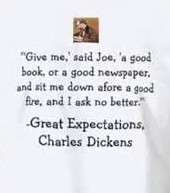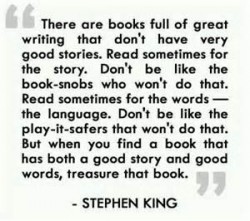 Recently I was discussing a book with one of my friends, and I told her I didn’t get what I expected to get from it and was disappointed. She asked me How do I decide what I expect from a book, and Do I always expect something?
Recently I was discussing a book with one of my friends, and I told her I didn’t get what I expected to get from it and was disappointed. She asked me How do I decide what I expect from a book, and Do I always expect something?
Hmmm…I hadn’t ever tried to define my feelings about books. So, after thinking about it a moment, here’s my answer.
I decide to read a book because of many variables. The subject. The synopsis of the story. Reviews and/or recommendations of friends. Book discussions. Previous works by that author. The author’s own enthusiasm about the book, as in an on-line or television interview, where he may have explained why he wrote it. From combinations of those things, I expect SOME of the following:
- The subject should be covered well. Nothing is worse than closing a book that promised information and having more questions than I had before I read it, or feeling like I hadn’t learned a darned thing.
- The story should hold my interest and deliver, emotionally, as promised. If I’m left feeling empty, with that “Is that all there is?” feeling, I’m disappointed. But those that leave me crying ‘Wait! Don’t leave yet!” are very satisfying.
- It should be well written and edited. No other explanation needed here.
- It should be of the same caliber, or better than, other works by that author. If I didn’t like the previous book(s), I wouldn’t be reading this one. So, ante up when you write that second novel.
Do I have high expectations? Yes. Do I always expect something? Yes. But not ALL of these things ALL the time. Do I get surprised? Sure. Sometimes it’s better than anticipated. Sometimes it’s different from what I expected, but opens up a whole new line of thought. And now and then I feel like I got dumped on by a favorite author.
My friend said she doesn’t expect anything from a book, but simply accepts it for what it is – the author’s way of telling the story. So I asked others how they felt about books and got a variety of answers.
Most agreed more with the first friend. A few said they will discard a badly edited book because it’s hard to read, but mostly read for the pleasure of the story, no matter how it’s told. And another put it into a perspective I hadn’t considered. He said that because he is not a writer, there are things that he isn’t acutely aware of while reading. He felt this probably makes the reading experience a bit more pleasurable for him.
A few asked me if I held myself to those standards. Yes. That may be why I am hesitant to self-publish. I don’t feel my work is ready yet.
Maybe I’m too picky/selective/particular. Or am I being a snob?
How about you? If you aren’t one of those I asked, please chime in. I’d love to know. What do you look for in a book?







I belong to a book-reading-and-discussion group this year so I have waded through some books that I was tempted to toss aside. (Dorothy Parker once said, “This book should not be tossed aside lightly; it should be thrown with great force.”) Usually I give a book a couple of chapters to get me hooked. I agree that trying to read poorly edited work is a distraction that usually keeps me from following the story no matter how good it may be.
Dot, I LOVE that Parker quotation! Wish I had found it and used it here!
Thanks.
I completely agree with you. If I’m going to invest time in a book, I expect to be informed or entertained. I don’t want to muddle through a poorly edited piece of work or something that wasn’t quite ready to be published.
In fiction, I need to care about the characters, and like you, I’m distracted by poorly written/edited work. I’m not a fast reader because I do read for language, the turn or a phrase. (We read Great Expectations one year in high school. I think it’s a product of its time, and not high on my favorites list.
We read it in high school, too, DJ. Not one of my favorites, either. Language felt very stiff, but as you said, a product of its time.